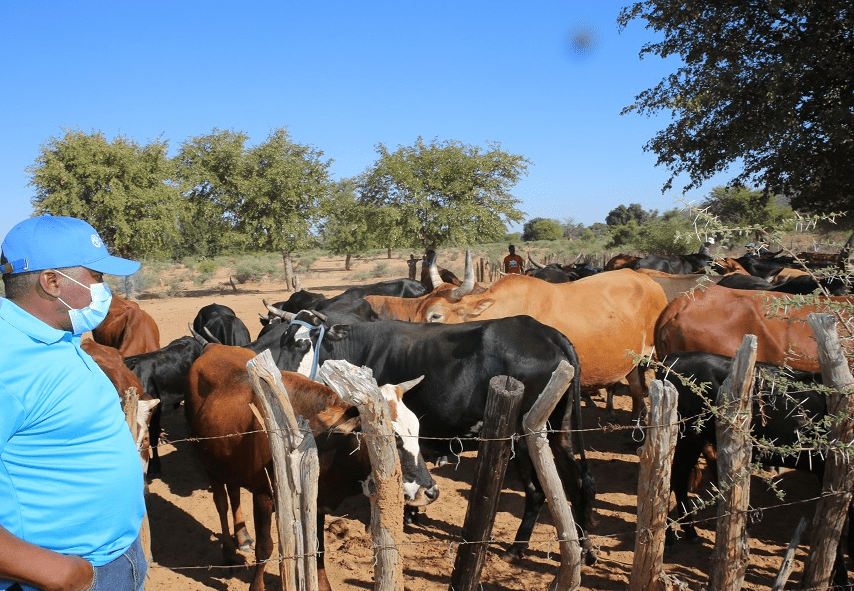Control of animal diseases strengthens herd size in Cyclone Idai affected areas

Cyclone Idai contributed to cattle mortalities in the target districts that ZIRP is working. Already the herd of cattle was reducing due to high tick-borne diseases (TBDs) induced by lack of repairs to communally owned dip tanks and erratic supply of acaricide for community dipping services.
“FAO under the ZIRP project responded to the situation through provision of forage seeds, vaccines for cattle, sheep, goats and poultry, acaricides for community dipping restoration; and rehabilitation of cyclone damaged dip tanks through a Build-Back- Better Approach. FAO is also helping farmers to deal with the effects of the harsh weather conditions, and protect their livestock,” said Brian Nhlema, FAO-ZIRP project coordinator.
Tick-borne diseases have a direct economic impact to rural farmers. At the local level, tick-borne disease reduce farmers’ income and food availability for consumption. Tick-borne diseases are also quite notably a major constraint to international trade in livestock products.
Zimbabwe is currently experiencing an incessant January Disease outbreak and many provinces have been affected by tick-borne diseases, particularly Theileriosis, better known as January disease, red water, heart water and gall sickness. Dipping is the most effective way of managing and controlling tick borne diseases in livestock.
“Before FAO we used to have irregular dipping. FAO has been helping us with acaricides; we have been doing regular and recommended dipping cycles. Our cattle are now tick free and healthy and regular dipping has also improved tsetse fly challenges for our cattle. Tick-borne diseases are now a thing of the past at our Chimhete diptank,” asserted Sherperd Danda, Diptank Livestock Development Committee (LDC) Vice Chairperson. “All functions of a cow are being put to use because they are no mortalities,” he added. Villagers in Chimanimani District rely on cattle “to pay for bride price,” milk, as a source of protein and as a store of value, paying school fees and as draft power.
“Cattle are our gold coin. It is a measure of wealth. When a farmer saves he buys a cow to investment money in. When a cow dies because of diseases he loses everything.”
– Sherperd Danda, Diptank Livestock Development Committee (LDC) Vice Chairperson
“One incorrect assumption is that the withdrawal of FAO support might impact the spread and prevalence of diseases in this area, but we are prepared,” says Danda. “Having learnt a lot and gained immense experience through FAO technical support we look to the future with optimism. The knowledge will help us manage and govern better our dip tanks and strengthen existing partnerships.
“Since FAO is currently providing us with acaricides, we are saving our contributions to ensure that once FAO support ceases we will be able to continue the programme. We are also working closely with the Local DVS office and the police to ensure that farmers who do not get their cattle dipped are heavily fined,” he added.
“The support provided by FAO to community diptanks resulted in reduced cases of tickborne dieaseas such as January Disease and other TBD related deaths at all the 546 FAO supported community managed dip tanks, showing the impact of regular dipping services,” said Department of Veterinary Services’ Nyanyadzi Office – Area Supervisor, Mutema Joseph.
“The ZIRP project complements a number of food security programmes FAO is currently implementing in Zimbabwe. FAO is currently providing support to the Government of Zimbabwe in the formulation of a Livestock Policy and FMD control strategy. Future livestock interventions in Manicaland will hence be implemented in close coordination with other on-going projects.
Livestock Development Committees (LDCs) were also trained on governance matters, environmental and social management at diptanks, including soil and water conservation structures. “The LDCs will also be provided with veterinary equipment and PPE to improve handling of acaricides and other hazardous chemicals,” added Brian.
